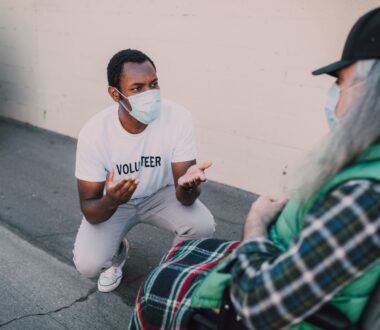
Informing Evidence-Based Medicine for Opioid Use Disorder Using Pharmacoeconomic Studies
Since 2021, over 100,000 individuals have died each year from a drug overdose, with approximately 76 percent of those deaths involving opioids. As the US health care system contends with this growing health crisis, improved access to evidence-based medication treatment for opioid use disorder (OUD) is imperative. Pharmacoeconomics, a branch of health economics used to evaluate comparative clinical, person-centered, and economic outcomes […]

Economic Evaluations of Establishing Opioid Overdose Prevention Centers in 12 North American Cities: A Systematic Review
In this systematic literature review published in Value in Health, CHERISH Research Affiliates Czarina Behrends and Ahmed Bayoumi, CHERISH staff members Jared Leff, Jazmine Li, and Erminia Fardone, CHERISH investigators Kathryn McCollister, Sean M. Murphy, and Bruce Schackman, and former NIDA summer intern, Weston Lowry, analyzed 16 studies that summarized and identified gaps of economic […]

Economic benefits of substance use disorder treatment: A systematic literature review of economic evaluation studies from 2003 to 2021
The economic burden of substance use disorder (SUD) is significant. It encompasses clinical and societal costs such as health care and social services, criminal justice resources, loss of productivity, and premature mortality, and is estimated to cost more than $700 billion per year in the United States. To understand the gravity of these economic costs, […]

Budget Impact Tool for the Incorporation of Medications for Opioid Use Disorder into Jail/Prison Facilities
Despite evidence that medications for opioid use disorder (MOUD), namely methadone, buprenorphine, and naltrexone, provided at the point of incarceration improve the well-being of the individual and the public, financial and administrative limitations in jail/prison healthcare often serve as barriers to this recommended first-line treatment for OUD. In fact, evidence indicates that more than 80% […]

Addressing Statistical Issues Encountered in Conducting Prospective Economic Evaluations Alongside Clinical Trials
Conducting an economic evaluation alongside a randomized clinical trial provides valuable information for clinicians, insurers, and policy stakeholders. Integrating an economic evaluation within a trial provides researchers the opportunity to collect patient-level data at multiple time points on both cost and effectiveness outcomes, and to measure the comparative impact of treatments on these outcomes while […]

Cost-effectiveness of Extended-release Injectable Naltrexone among Incarcerated Persons with Opioid Use Disorder Before Release from Prison Versus After Release
Compared to the general population, individuals with opioid use disorder (OUD) who are involved with the criminal-legal system have a much higher risk of a fatal overdose after release from incarceration. Yet, stigma, costs, and preferences for non-narcotic treatments in criminal-legal settings have stalled the implementation of life-saving treatment within the criminal-legal system. Extended-release naltrexone […]

Cost of Hepatitis C Care Facilitation for HIV/Hepatitis C Co-infected People Who Use Drugs
The development of direct-acting antivirals transformed hepatitis C virus (HCV) therapy, allowing patients to experience fewer side effects and non-specialist providers to prescribe HCV treatment with more ease. Despite these advances, existing social and structural barriers, such as stigma and accessibility of medical care, restrict access to effective HCV treatment for people who use drugs […]

Weighing the Costs and Benefits of Initiating Extended-release Injectable Naltrexone Compared to Buprenorphine-naloxone
Naltrexone and buprenorphine are two effective medications for opioid use disorder (OUD). Naltrexone, which is typically given as a monthly extended-release injection (XR-NTX), and daily oral buprenorphine, which is typically combined with naloxone (BUP-NX), are prescribed in outpatient or office-based medical settings. XR-NTX patients, however, need to complete detoxification before starting treatment. Results from a […]

Hospitalization as a Reachable Moment for Patients with Opioid Use Disorder
Imagine a medication that reduces morbidity and mortality from a disease that affects more than two million people in the United States. The medication drastically improves quality of life for those who take it and reduces costs to the health care system. For hospitalized patients, this medication decreases the chance of being readmitted and of […]

Economic Evaluations of Pharmacologic Treatment for Opioid Use Disorder: A Systematic Literature Review
In this systematic review, researchers affiliated with the Center for Health Economics of Treatment Interventions for Substance Use Disorder, HCV, and HIV (CHERISH) including CHERISH staff Erica Onuoha and Jared Leff; CHERISH investigators Bruce R. Schackman, Kathryn E. McCollister, and Sean M. Murphy; and CHERISH Advisory Board member Daniel Polsky, identified new studies supporting buprenorphine and methadone as economically advantageous medications for […]

Harmonizing Healthcare and Other Resource Measures for Evaluating Economic Costs in Substance Use Disorder Research
Lindsay Allen, PhD, MA, Feinberg School of Medicine at Northwestern University The National Institute on Drug Abuse, or NIDA, considers data harmonization in substance use disorder, human immunodeficiency virus (HIV), and hepatitis C virus (HCV) research a high-priority. Data harmonization allows investigators to synthesize data across independent studies and promote more rigorous and comparable analyses of […]

Healthcare utilization patterns among persons who use drugs during the COVID-19 pandemic
The COVID-19 pandemic has changed the way individuals access the healthcare system. For example, recent studies suggest high-risk populations may be foregoing necessary care out of fear of entering healthcare facilities and contracting the virus. A new study by Sean Murphy, PhD, associate professor of population health sciences at Weill Cornell Medicine and director of the methodology core […]
Engage with CHERISH
Submit a Consultation Request or Contact Us to learn more about how CHERISH can support your research or policy goals.